The Batwa Pygmies are a group of people found in Uganda and known for their short stature. They live around the protected forest reserves of Bwindi and Mgahinga national parks. They also settled in the Echuya Forest Reserve where they are referred to as the ‘Echuya Batwa’. Mgahinga, Bwindi and Echuya Forest are found in South western Uganda (Kisoro, Kanungu and Kabale districts). Often referred to as the ‘keepers of the forests’, the Batwa Pygmies are believed to have been the first inhabitants of the East African great lakes region.
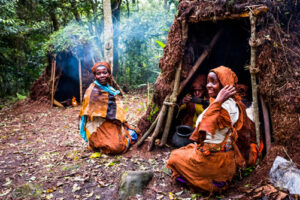 They migrated from the Ituri forests of Congo to the forest in South Western Uganda in search of wild edible fruits and bush meat. The Batwa lived exclusively as hunters and gatherers for over 1000 years until recently. After leaving Congo and settling in the forests of South Western Uganda, the Batwa Pygmies lived peacefully with the wild animals of the forests. They depended on the forest for all their needs and would live off hunting or gathering fruits. The forests also provided herbs for medicine which would help cure common ailments. The Batwa built ground shelter in form of small huts made of reeds and leaves. Some preferred setting up shelter on top of trees. The Batwa people lived a simple but peaceful life and never needed to depend on the world outside the dense forests. The Batwa rarely encountered and tended to avoid other tribal groups living outside the forests. That was until they were abruptly evicted from these very forests by the government recently.
They migrated from the Ituri forests of Congo to the forest in South Western Uganda in search of wild edible fruits and bush meat. The Batwa lived exclusively as hunters and gatherers for over 1000 years until recently. After leaving Congo and settling in the forests of South Western Uganda, the Batwa Pygmies lived peacefully with the wild animals of the forests. They depended on the forest for all their needs and would live off hunting or gathering fruits. The forests also provided herbs for medicine which would help cure common ailments. The Batwa built ground shelter in form of small huts made of reeds and leaves. Some preferred setting up shelter on top of trees. The Batwa people lived a simple but peaceful life and never needed to depend on the world outside the dense forests. The Batwa rarely encountered and tended to avoid other tribal groups living outside the forests. That was until they were abruptly evicted from these very forests by the government recently.
The plan to evict the Batwa from the forests of South Western Uganda was laid way back in the 1930s by the Colonial Administrators at the time. It was executed in the early 1990’s after Bwindi National Park 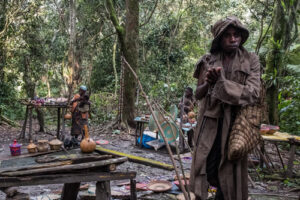 was declared a protected area. This meant that the Batwa Pygmies were expected to vacate the only home they knew. They were displaced without compensation or land to go and settle in. The reason given by the government for their eviction from the forests of Bwindi, Mgahinga and the greater Echuya was to promote wildlife conservation along with tourism. The government felt that evicting the Batwa was to safeguard the gorillas and chimpanzees from catching human related illnesses considering. Having nowhere to move to and not familiar with life outside the forests, the Batwa decided to re-settle at the outskirts of the Bwindi, Mgahinga and Echuya forests.
was declared a protected area. This meant that the Batwa Pygmies were expected to vacate the only home they knew. They were displaced without compensation or land to go and settle in. The reason given by the government for their eviction from the forests of Bwindi, Mgahinga and the greater Echuya was to promote wildlife conservation along with tourism. The government felt that evicting the Batwa was to safeguard the gorillas and chimpanzees from catching human related illnesses considering. Having nowhere to move to and not familiar with life outside the forests, the Batwa decided to re-settle at the outskirts of the Bwindi, Mgahinga and Echuya forests.
The Batwa Pygmies – Life after Eviction from the Forests
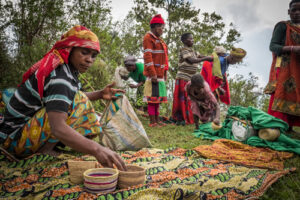 Having re-settled outside the Bwindi, Mgahinga and Echuya forests, life was never the same for the Batwa people. They were not prepared for the challenges of life outside the forest. This life involved farming, petty trade, business principles or toiling to make ends meet. This kind of life was alien to the Batwa who were accustomed to gathering free wild fruits, hunting small game and enjoying free honey in the forest. Now the Batwa had to live with tribal groups they had avoid and had to deal with discrimination.
Having re-settled outside the Bwindi, Mgahinga and Echuya forests, life was never the same for the Batwa people. They were not prepared for the challenges of life outside the forest. This life involved farming, petty trade, business principles or toiling to make ends meet. This kind of life was alien to the Batwa who were accustomed to gathering free wild fruits, hunting small game and enjoying free honey in the forest. Now the Batwa had to live with tribal groups they had avoid and had to deal with discrimination.
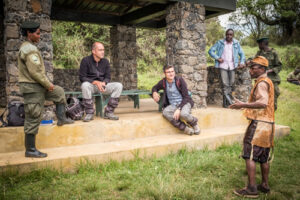 The Batwa were forced to carry heavy loads to market places because they couldn’t do most of the work. Getting a place in the main markets was difficult because the Batwa had nothing to sell. They had no prior exposure to business or how to run it. As time went on, the Batwa people gradually lost touch with their cultures and traditions. This loss was swift because most of their culture and traditions were connected to the forests where they were born and raised. Traditional habits like identifying herbal medicines, hunting and collecting wild honey could only remain relevant if they continued living in the forest.
The Batwa were forced to carry heavy loads to market places because they couldn’t do most of the work. Getting a place in the main markets was difficult because the Batwa had nothing to sell. They had no prior exposure to business or how to run it. As time went on, the Batwa people gradually lost touch with their cultures and traditions. This loss was swift because most of their culture and traditions were connected to the forests where they were born and raised. Traditional habits like identifying herbal medicines, hunting and collecting wild honey could only remain relevant if they continued living in the forest.
The Present Day Batwa People
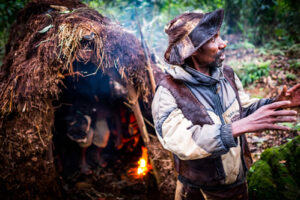 The present day generation of the Batwa Pygmies have tried to adapt to a new life outside the forests of South Western Uganda. They have had to learn how to survive for the sake of their families. They now grow fruits, vegetables and crops like potatoes for livelihood. The Batwa also rear domestic animals and keep bees to harvest honey for sell at the market. Some of the Batwa people have formed music and dance troupes to entertain tourists who visit their camps or in hotels found in the neighboring communities.
The present day generation of the Batwa Pygmies have tried to adapt to a new life outside the forests of South Western Uganda. They have had to learn how to survive for the sake of their families. They now grow fruits, vegetables and crops like potatoes for livelihood. The Batwa also rear domestic animals and keep bees to harvest honey for sell at the market. Some of the Batwa people have formed music and dance troupes to entertain tourists who visit their camps or in hotels found in the neighboring communities.
The Batwa people have also been receiving support from government bodies like the Uganda Wildlife Authority (UWA), the National Forest Authority (NFA) and other development partners. These 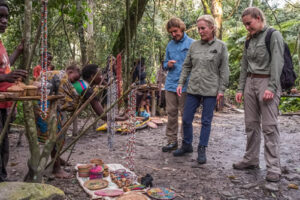 development partners and Non-Government Organizations include the Kellerman Foundation and the United Organisation for Batwa Development in Uganda. These organizations and government Agencies have worked hard to help the Batwa people adapt to life outside the forest. They provide low cost social services like health care, education and clean water sources. The government and International Development Agencies also provide materials to the Batwa for constructing permanent homes. Unfortunately, despite great effort by the government and international Development Agencies, it is not correct to say that the Batwa people have adapted to life outside the forest. Most of the elderly Batwa still
development partners and Non-Government Organizations include the Kellerman Foundation and the United Organisation for Batwa Development in Uganda. These organizations and government Agencies have worked hard to help the Batwa people adapt to life outside the forest. They provide low cost social services like health care, education and clean water sources. The government and International Development Agencies also provide materials to the Batwa for constructing permanent homes. Unfortunately, despite great effort by the government and international Development Agencies, it is not correct to say that the Batwa people have adapted to life outside the forest. Most of the elderly Batwa still 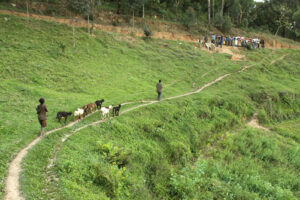 reminisce about life in the forest and how everything was so easy back in the days. It is the young generation of Batwa people who are coping well. Many have embraced education and are doing well.
reminisce about life in the forest and how everything was so easy back in the days. It is the young generation of Batwa people who are coping well. Many have embraced education and are doing well.
It is important to point out that many Batwa people have taken advantage of the opportunities presented by gorilla tourism. Some act as Guides or work in the hotels found in Bwindi and Mgahinga National Park. They also earn money by selling souvenir to tourists. The issue of proper compensation of the Batwa for their evictions is still a sensitive matter but that only the government can resolve.
Visiting the Batwa People of Uganda
Most Travelers visiting Bwindi or Mgahinga National Park for gorilla trekking usually add the Batwa Cultural experience for a complete tour. It is one way of supporting the Batwa people. The Batwa sell souvenirs and other artisan products to tourists. Money generated from tourism helps support some of projects supporting the Batwa. The Batwa visit in Bwindi is less exciting compared to the Batwa 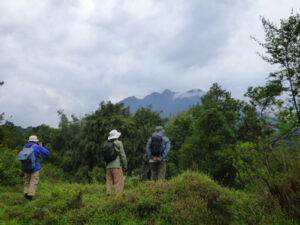 Trail organized in Mgahinga. The experience in Mgahinga takes longer and is designed to be led by the Batwa people themselves. The Batwa Trail in Mgahinga is organized in the forest. Visitors are led by the Batwa to their former forest homes where they get to learn everything about the life of these hunters and gatherers. Travelers are taught how to hunt, identify local medicines/herbs and know the different sounds in the forest. The experience in Bwindi takes you to one of the Batwa settlements at the edge of the forest for cultural entertainment and some exposure to how the people lived off the forest. The experience in Bwindi takes a shorter time and doesn’t take you right into the forest for an authentic experience.
Trail organized in Mgahinga. The experience in Mgahinga takes longer and is designed to be led by the Batwa people themselves. The Batwa Trail in Mgahinga is organized in the forest. Visitors are led by the Batwa to their former forest homes where they get to learn everything about the life of these hunters and gatherers. Travelers are taught how to hunt, identify local medicines/herbs and know the different sounds in the forest. The experience in Bwindi takes you to one of the Batwa settlements at the edge of the forest for cultural entertainment and some exposure to how the people lived off the forest. The experience in Bwindi takes a shorter time and doesn’t take you right into the forest for an authentic experience.
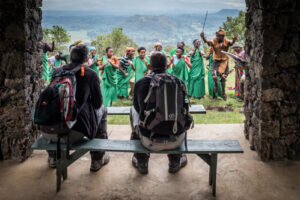 Regardless of whether you go for the Batwa visit in Bwindi or the more comprehensive Batwa Trail in Mgahinga, you should expect to learn a lot about the tribe. You may even question if it was the right thing to remove them from the forest. A typical visit involves observing the women prepare meals for their families and meeting the elders of the community. These elders will share important information about how the Batwa hunted for bush meat, how they would harvest honey or identified the right medicinal plants to cure the sick. At the end of each encounter, expect to be entertained with joyful songs and dances from the dance troupes.
Regardless of whether you go for the Batwa visit in Bwindi or the more comprehensive Batwa Trail in Mgahinga, you should expect to learn a lot about the tribe. You may even question if it was the right thing to remove them from the forest. A typical visit involves observing the women prepare meals for their families and meeting the elders of the community. These elders will share important information about how the Batwa hunted for bush meat, how they would harvest honey or identified the right medicinal plants to cure the sick. At the end of each encounter, expect to be entertained with joyful songs and dances from the dance troupes.
